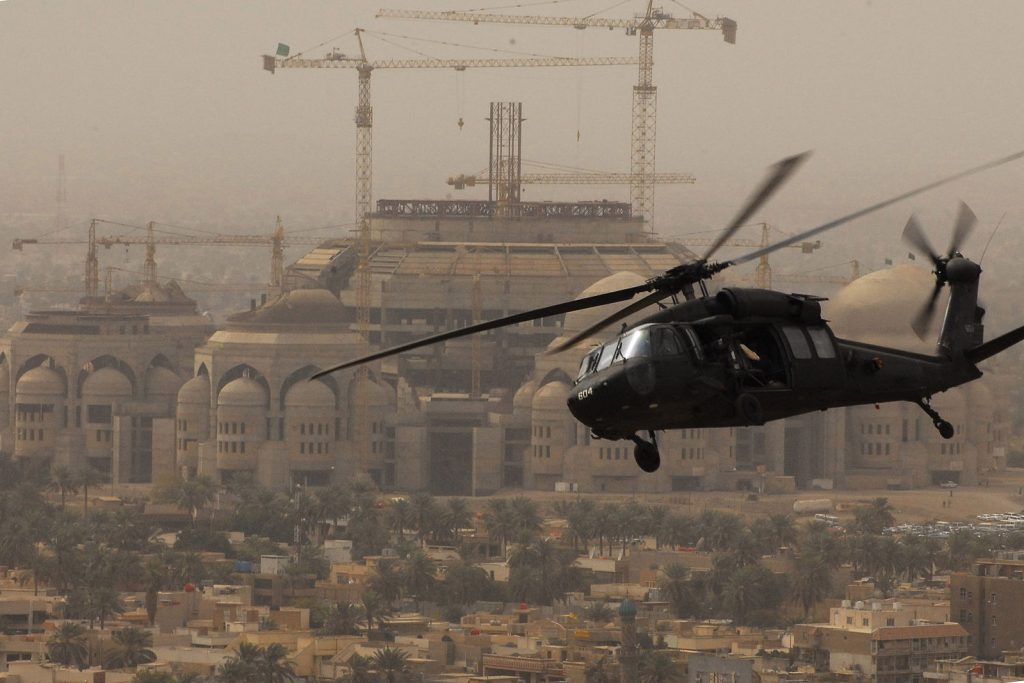Stakes in Iraq: U.S. and Iran vie for power
The United States’ tough stance on Iran has left many nations in a fix. Iraq is among those most afflicted by the battle for influence – and it remains to be seen whether Iran or the U.S. will prevail.
When it comes to American foreign policy, few publications are as gung-ho as the Wall Street Journal. On the question of the future of the Middle East, the paper has a long history of hawkish views on the Islamic Republic of Iran. No pressure on Tehran is enough and no amount of sanctions unjustified. And yet, even the Wall Street Journal has lately been raising questions about the regional collateral damage that the U.S. is inflicting on itself as it looks to complete its “maximum pressure” campaign against Iran. America’s offer of a choice to allies to pick either Iran or the United States, and the extraterritorial sanctions that come with not complying with its wishes, is putting a lot of countries in an awkward spot. And few countries feel the heat in this U.S.-Iran tussle as much as Iraq.
The question is about the bigger costs and consequences for U.S. interests in Iraq as Washington tightens the sanctions on Iran. Within a few days of Mike Pompeo’s January visit to Baghdad, Iran’s Foreign and Oil Ministers had arrived in Iraq and this was hard for the U.S. business community to ignore. The Iranians are directly challenging U.S. commercial plans for Iraq. In particular, U.S. firms are keen to sell to Iraq energy and infrastructure projects, which the Iranians are keen on as well. And yet, Iranian and Iraqi political and commercial ties are too close and integrated for Washington to be able to break it.
Iran and Iraq build economic bridges
The message from the skeptics in the U.S. is that Washington needs to figure out a new policy on Iran in order not to lose Iraq as well. For the U.S., to lose influence in Iraq because of Washington’s Iran policy would be a strategic blunder of major proportions. Meanwhile, the Iranians and the Iraqis are busy finding new banking channels that can allow for trade between the two countries to continue. If this happens, then Iran’s hope is that it will have to rely less on the financial sector in the United Arab Emirates (UAE), its historic financial gateway to the rest of the world, for banking services. Many Iranian merchants are increasingly seeing Iraq as a suitable hub and transit for Iran’s international trade. As Dubai is becoming more and more expensive and difficult for Iranian businesses to operate in (where some reports speak of plummeting trade volumes between Iran and the UAE), Iraq has a potential commercial role to play for Iran that benefit both countries.
And the U.S.’s political ultimatum leaves Iraq with split loyalties. As explained in the Bertelsmann Transformation Index (BTI) country report on Iraq both nations have played a key role, albeit with negative side effects. “The U.S. and Iran remain the most important international partners for Iraq. Both can be seen as a double-edged sword. While they both try to stabilize the current Shi’ite-dominated government, not least in its fight against IS, their massive support also increases corruption and crony capitalism.”
But economic ties between the middle eastern neighbors are clearly on the rise. Iraq is already Iran’s biggest export market for non-oil goods and Tehran and Baghdad claim that trade can increase from the present $12 billion a year to $20 billion a year. That Iraq is also mentioned as a potential mediator between both Iran and the U.S. and Iran and Saudi Arabia signifies the unique role that various corners see the country to be able to play. The Americans, to be sure, know that Washington’s sanctions on Iran can hurt Iraq and American interests in that country. For that reason the Trump administration issued to sanction waivers to Baghdad so it could continue to import Iranian gas and electricity. When this waiver was not renewed in April 2019, the Iraqis simply shrugged and stated that complying with U.S. sanctions on Iran is not possible.
Iraq seeking better relations with the Arab World
In short, while official Iraqi statements suggest that Baghdad cannot or will not adhere to U.S. sanctions on Iran, the Iranians are taking no risks and hence the flurry of senior officials visiting Baghdad. In a way, the biggest test to date for President Trump’s “maximum pressure” campaign against Iran is still under way in countries like Iraq that are squeezed by both Iran and the United States.
The visit of Iraqi Prime Minister Adel Abdul-Mahdi to Tehran in early April came shortly after President Rouhani’s visit to Baghdad. The aim of the visit was to build on agreements that had been reached in Baghdad a few weeks earlier. But Abdul-Mahdi’s visit was hugely shaped by ongoing Iraqi efforts to normalize its ties to the Arab World, a process that can pose a risk to Tehran’s agenda for Iraq. Shortly before he arrived in Tehran, Abdul-Mahdi held meetings in Cairo with President Sissi and King Abdullah of Jordan. And Abdul-Mahdi is scheduled to visit Riyadh soon.
But the Iranians are not making life any easier for the Iraqi leadership. Iran’s Supreme Leader Ayatollah Ali Khamenei’s message to Abdul-Mahdi to kick out the American military from Iraq and to be careful about the Saudi intentions is nothing but unhelpful meddling in Iraq’s internal affairs. But Khamenei would have never said such words if he did not think he can get away with it. This shows the Iranians do not fear Abdul-Mahdi political weight or for him to act independent from Tehran. While Baghdad wants to stay close to Iran, it has to at least symbolically keep itself in the body of the Arab World. But there are otherwise plenty of signs that Iran-Iraq ties are in a good state.
American strategy not shifting public opinion
Overall, there was one key audience for Rouhani’s March visit to Iraq. It was to send a message to Washington and her Arab allies that Iran is in Iraq to stay and Baghdad will not follow an anti-Iran line. Washington is carefully watching developments in Iran-Iraq relations, and more so after Rouhani’s visit to Baghdad. The Trump administration has invested heavily in moving Baghdad away from Tehran but on a public level this American strategy is not working. Officials in Tehran are already declaring Rouhani’s visit as “historic” moment in Iran-Iraq relations. Baghdad has made it clear it cannot do without Iranian energy in the foreseeable future. Meanwhile, Tehran is explicit about its desire to play a big role in the huge economic reconstruction efforts that are expected to be underway both in Iraq but also in Syria. This ties to the second point, which rests on the need for security cooperation and Tehran’s argument to Baghdad that the Iran’s assistance is still required to completely root out remnants of ISIS.
In this effort, the Iranians are painting the Trump administration as uncommitted to Iraqi security and point to Trump’s oscillating stance on the U.S. role in the Middle East and his one and only visit to Iraq in December where he failed to meet any of the Iraqi leadership. Third, from Tehran’s perspective, Rouhani’s visit to Baghdad was symbolically biting given months of U.S. efforts to dislodge Iraq away from Iran. Tehran takes any opportunity to invalidate the idea that it can be isolated. Moreover, the issue is also that the “Iraq” file in Tehran is viewed differently depending on who you ask. The Office of the Supreme Leader and the Revolutionary Guards put the emphasis on security matters (fight against ISIS, support Shia militias, etc.) as the essential component that should keep Iran deeply involved in Iraq.
For others, including the Foreign Ministry, the Oil Ministry, this is not enough to put too much hope in the Iraqis. Someone like the Iranian oil minister, Bijan Zangeneh, has openly lamented lack of cooperation from his Iraqi counterparts. Still, the challenge for Rouhani is to move beyond symbolism and annoying the Americans by genuinely convincing the Iraqis to broaden the cooperation. This would mean retaining the level of security/military cooperation but upgrading cooperation elsewhere (particularly in energy and banking sectors where Iran is keen to elevate ties with Baghdad thanks to sanctions which Tehran is under). It obviously becomes a test of sorts for the Trump administration should Tehran succeeds in its efforts in Baghdad. In other words, Tehran is hopeful for more from Iraq but it is not blind to the pressures Baghdad is under from Washington.
First published in German on FAZ.net

